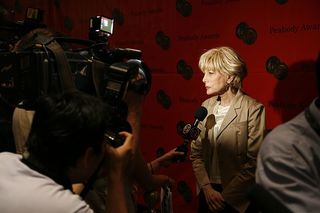Gratitude
Reflection and Gratitude Can Deflect Fake News Anger
Lesley Stahl says Trump admits using "fake news" to discredit reporters.
Posted August 5, 2018

In a season of campaign frenzy leading up to the 2018 midterms, accusations of “fake news” are being hurled at the legitimate press. Rather than being dragged into anger when the free press is maligned, we can reject deceptive rhetoric and choose reflection and words of gratitude.
For the next few months, we may be bombarded by divisive slogans, exaggerations, and falsehoods. Mainstream media will be called fake news simply to obfuscate the truth. Sometimes it will be easy to learn the truth and sometimes confusing.
U.S. Intelligence contradicts Trump
On August 2, 2018, four U.S. Intelligence Agency members held a press conference and decried the involvement of Russia and other foreign actors in our elections. Some hours later, Trump praised his meeting with Putin and decried the “Russian hoax” at a rally where he called out the "fake, fake disgusting news" while pointing to the media. These words cheered his base, but distressed people who believe in a free press and knew that he was not telling the truth.
Fake news deception
This “fake news” cry is apparently deliberate. Lesley Stahl said in an interview with PBS News' Judy Woodruff that Trump told her he keeps hammering the press so that when they write negative stories no one will believe them. She said:
It's just me, my boss, and him — he has a huge office — and he's attacking the press. There were no cameras, there was nothing going on and I said, 'That is getting tired, why are you doing it? You're doing it over and over and it's boring. It's time to end that, you've won the nomination. And why do you keep hammering at this?'
And he said: 'You know why I do it? I do it to discredit you all and demean you all so when you write negative stories about me no one will believe you.' (Lesley Stahl interview/ Real Clear Politics.)
Sometimes catching fake news is just this simple. However, we know that there are ways to spot fake news even though it is powerful and confusing. To keep from becoming trapped in deliberately deceptive stories, people simply need to think a bit.
Become reflective. Often people distrust themselves. In Trump's case, he will say whatever it takes to appease his base. But such rhetoric can slip into one's thinking and create confusion. According to Professor Steven Sloman at Brown University it appears that an illusion of understanding “emerges because people fail to distinguish what others know from what they themselves know."
For example, it can be seen as a mix-up of understanding by confusing other people's thinking or knowledge with one's own. To overcome this problem, he says, "The trick is to not only come to a conclusion, but to verify that conclusion." (Why We Pretend to Know Things: Ethical Psychology)
Express gratitude. Here is how gratitude can help: Professor Robert Emmons of the University of California, Davis, is editor-in-chief of the Journal of Positive Psychology. He said in a previous interview with me:
"Gratitude is an attitude, not a feeling that can be easily willed," he says. It seems that even if you are not satisfied with your life as it is today, he noted, "If you go through grateful motions, the emotion of gratitude should be triggered. It is like improving your posture and, as a result, becoming more energetic and self-confident.
"Attitude change often follows behavior change. By living the gratitude that we do not necessarily feel, we can begin to feel that gratitude that we live." (Gratitude as Science)

It is important that we find ways and situations for which to be grateful during these divisive times. Perhaps shift away from fake news and focus on the work that the young students from Parkland are doing to get out the vote across the country. Participate. (Activism Became an Act of Love After Student Shootings)
Also, here is an interesting interview with May McCarthy from Forbes magazine in June. A mentor and consultant with CEOs, she uses a gratitude technique that involves giving thanks in advance of attaining one’s goal:
"As I started to be grateful for the things that I wanted in advance, like great employees that worked for us, that were easy to manage and self-starters and things like that, what I ended up finding out was that I could notice more possibilities to take some action that was in alignment with my goals. So gratitude somehow had this ability to illuminate more possibilities. So I started to become grateful for things I wanted, and worded it as though I already had it." (This Morning Routine is a Key to Success)
Social media strategies. While it may not work to be grateful in advance for an election outcome of one’s favorite candidate, here are four strategies to use on social media that can have a positive personal outcome.
- Expressing gratitude for a free press rather then hurling insults back at Trumpers.
- Being grateful for free elections and becoming active in the political process.
- Posting positive news stories to overpower the negativity that prevails.
- Challenging yourself to respond in a factual manner even to insults.
Here's how: After a Twitter user replaced Chelsea Clinton's face with the marionette, Howdy Doody, she responded:
"Thanks to Richard & all the people on @Twitter who've compared me to Howdy Doody," she wrote. "I now know a bit about him, including that he stood up to bullies & believed in being kind to animals. I'm always happy to be on the side of allyship & kindness. Thanks again!"
From a 2003 movie, The Fighting Temptations, with Cuba Gooding, Jr. and Beyonce, the words of Reverend Lewis still resonate: “Love your enemies, it will drive them crazy.” More important, it is better for your health to conjure up positive words rather ruminate over negative ones.
Copyright 2018 Rita Watson




